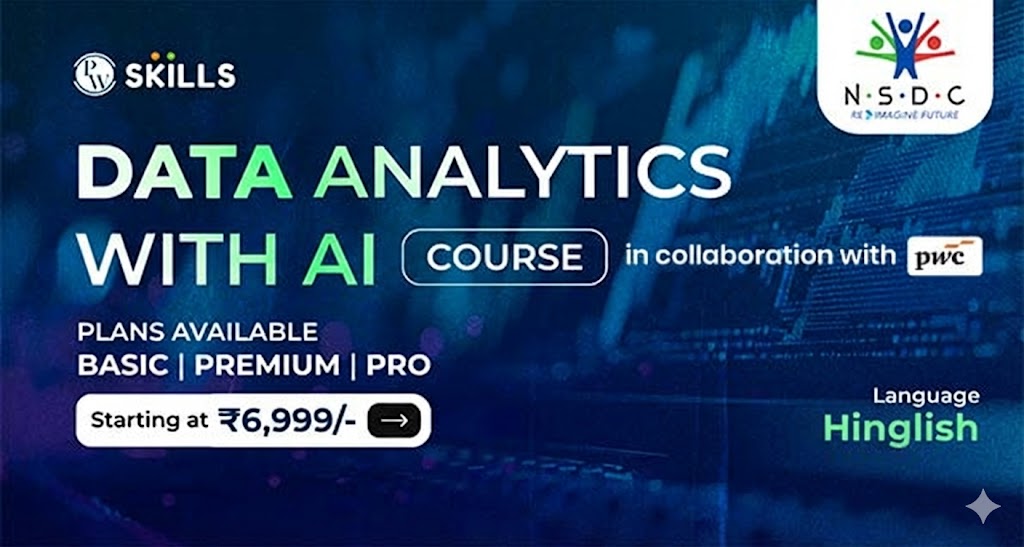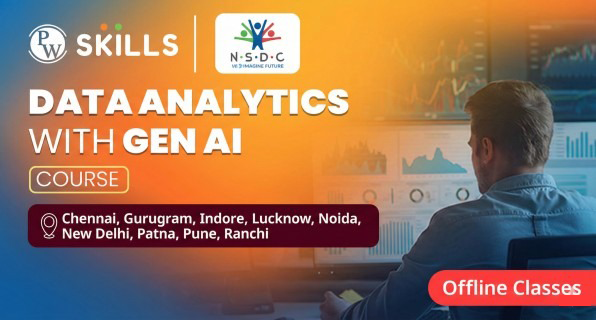Data is not only a by-product of business; it is now the engine which drives into decision-making, innovation, and expansion. With this explosion in data, three roles dominate the conversation: data analyst vs data scientist vs data engineer. Although they all deal with data, their purposes, skill set, and impact on businesses are different from each other.
As a result, many students and professionals get confused and ask, “Are these data analyst vs data scientist vs data engineer roles interchangeable?” or “Which one should I choose?” However, it is essential to learn and understand the differences not only in career planning but also in navigating the fast-evolving data-driven industries of today.
This guide basically explains everything needed about each data analyst vs data scientist vs data engineer role, the similarities of skills they have, and the hows and whys of divergence regarding responsibilities, payment, and career growth. By the end of this, not only will you know the difference among data analyst vs data scientist vs data engineer, but where your own strengths fit best.
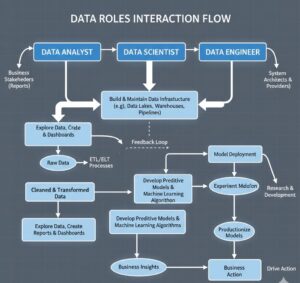
Data Science vs Data analytics vs Data engineering vs Machine learning
Before going to the data analyst vs data scientist vs data engineer titles, let’s clear the fog of the fields.
- Data Analytics is like being a detective: you look at past data, find patterns, and explain why things happened.
- Data Science is like being a prophet, but using math. Using data plus machine learning, you can see what will probably happen next.
- Data Engineering is like being the builder of the city. Here you put the pipelines, define the databases, and configure the systems that make it possible to analyze and perform data science.
In short, Machine Learning is the magic contraption. This is when computers learn from data patterns (like how Netflix predicts your next binge).
Simply put:
- Data Engineers build the roads.
- Data Analysts drive on them and report what’s happening.
- Data Scientists build self-driving cars on those roads.
Benefits of Data Analyst, Data Scientist & Data Engineer
| Role | What They Do | Benefits to Company | Benefits to Society / People |
|---|---|---|---|
| Data Analyst | Looks at past and present data, makes charts, and explains trends. | – Helps leaders make better decisions quickly. – Finds patterns in sales, profits, or customer behavior. | – Makes services easier to understand (e.g., banking dashboards). – Helps improve products we use daily. |
| Data Scientist | Builds smart models and uses AI/ML to predict the future or solve complex problems. | – Creates accurate forecasts (e.g., sales for next year). – Helps in launching new products with less risk. | – Improves daily life with recommendations (YouTube, Netflix). – Advances healthcare (predicting diseases early). |
| Data Engineer | Manages big amounts of data, builds systems, and makes sure everything runs smoothly. | – Ensures fast and safe flow of data inside the company. – Keeps data ready for analysts and scientists to use. | – Powers apps we rely on (Google Maps, Amazon, Swiggy). – Supports society by handling large-scale data like traffic, weather, or energy use. |
Who is a Data Analyst?
Let’s say your boss asks: “Why are sales dropping in the North region?”
That’s where a Data Analyst jumps in, digs through sales spreadsheets, makes charts, and explains that maybe the festive discount wasn’t marketed properly.
Beginner-friendly definition: A Data Analyst takes raw data, cleans it, and translates it into business insights using tools like Excel, SQL, Power BI, or Tableau.
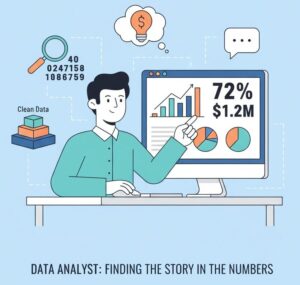
Daily tasks include:
- Extract data from databases
- Cleans “messy” data
- Making dashboards and charts
- Explain trends with layman language
Skills required:
- SQL (to talk to databases)
- Excel (the classic weapon)
- Visualization tools (Power BI, Tableau)
- Basic Python/R
Example in action: Flipkart’s marketing team wants to know which campaign brought the highest ROI. A Data Analyst crunches the ad performance data and shows which ads performed best.
Who is a Data Scientist?
What if Flipkart wanted to go one step further and not just address the past but also forecast, like “Which customers are likely to buy again next month?”
This is where a Data Scientist would come in.
Beginner-friendly definition: A Data Scientist uses advanced math, statistics, and machine learning to construct predictive models that answer future-centered questions.
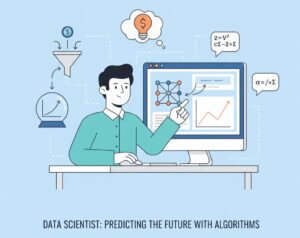
Daily tasks include:
- Collecting and cleaning huge datasets
- Writing machine learning algorithms
- Running experiments and testing models
- Explaining complex results to business teams
Skills required:
- Strong Python or R
- Statistics and probability
- Machine learning libraries (scikit-learn, TensorFlow, and PyTorch)
- SQL + big data tools
Example in action: Netflix predicting which movie you will like based on your previous watch history. That is data science in action.
Who is a Data Engineer?
Now, just imagine Netflix without data pipelines. Your app > database > analytics system: that is how the data from millions of viewers has to travel. Without a solid backbone, nothing works.
This is where a Data Engineer comes to the rescue.
Beginner-friendly definition: The construction and establishment of systems, pipelines, and architectures that allow data to be economically worked on by analysts and scientists is built by the data engineer.
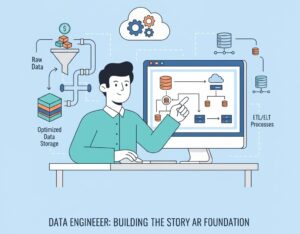
Daily tasks include:
- Creating data warehouses and lakes
- Write ETL pipelines
- Optimize databases for speed and scale
- Ensures secure and reliable data flow
Skills required:
- SQL + NoSQL databases
- Big data tools (Hadoop, Spark)
- Cloud platforms (AWS, Azure, GCP)
- Programming in Python/Java/Scala
Example in Action: Daily, millions of songs stream on Spotify. Data engineers construct the systems capturing user plays in real time and send for recommendation models.
Data Analyst vs Data Scientist vs Data Engineer: Key Distinctions
Quick comparison where similarities and therefore distinctions may arise:
| Role | Focus | Tools | Output | Example |
| Data Analyst | Understanding past data | Excel, SQL, Tableau, Power BI | Reports, dashboards | “Why did sales fall in Q2?” |
| Data Scientist | Predicting future outcomes | Python, R, ML libraries | Predictive models, AI tools | “Which customer will churn?” |
| Data Engineer | Building data pipelines | SQL, Hadoop, Spark, AWS | Databases, pipelines, warehouses | “How do we store data from 1M users?” |
Histories of Evolution About These Roles
Data Science has never technically existed as a disparate career path until now. The early 2000s saw businesses working with spreadsheets, basic reporting tools, and the like. It was a time when data were available but processes to act on that data weren’t formally created.
With companies don’t want to digitalize and with an information explosion, specialization became the only way forward.
- Data analysts were required to make sense of historical data and provide targets.
- Data engineers were required to build pipelines for the data and storage and availability to it.
- Data scientists came into being to design predictive models and machine-learning solutions.
These three data analyst vs data scientist vs data engineer roles, collecting, processing, and predicting, emerged as an evolutionary response to three critical questions of the data workflow. The three roles’ origin-and-evolution story partly explains their differences and interdependence.
Benefits of Data Analyst, Data Scientist & Data Engineer
| Role | What They Do | Benefits to Company | Benefits to Society / People |
|---|---|---|---|
| Data Analyst | Looks at past and present data, makes charts, and explains trends. | – Helps leaders make better decisions quickly. – Finds patterns in sales, profits, or customer behavior. | – Makes services easier to understand (e.g., banking dashboards). – Helps improve products we use daily. |
| Data Scientist | Builds smart models and uses AI/ML to predict the future or solve complex problems. | – Creates accurate forecasts (e.g., sales for next year). – Helps in launching new products with less risk. | – Improves daily life with recommendations (YouTube, Netflix). – Advances healthcare (predicting diseases early). |
| Data Engineer | Manages big amounts of data, builds systems, and makes sure everything runs smoothly. | – Ensures fast and safe flow of data inside the company. – Keeps data ready for analysts and scientists to use. | – Powers apps we rely on (Google Maps, Amazon, Swiggy). – Supports society by handling large-scale data like traffic, weather, or energy use. |
Industry Transformation: How These Roles Are Changing the Game
Don’t just make a living; these data analyst vs data scientist vs data engineer – data roles are changing entire industries:
- Healthcare: Predictive models for disease-recognition engineered to work with diagnostic MRI data with patient trend interpretation provided by analyst training.
- Fintech: Real-time data pipelines for fraud detection, AI-models for processing, and dashboarding for user reporting.
- Retail & E-commerce: Analysts interpret the sales patterns, scientists forecast demand, and engineers upscale the management of transaction logs.
- Manufacturing & IoT: Predictive maintenance collaborating with sensor data, where all three work efficiently.
These examples show how data professionals do not exist in isolation; they are industry transformers. Companies now rely on this expertise to survive.
The Scope & Demand: Why Companies Can’t Hire Enough
India, more so, is a hotbed for data analyst vs data scientist vs data engineer. roles. Here are the reasons :
- Digital payments and the UPI have been implementing massive real-time data streams.
- Startups require engineers and scientists to demand scalable data solutions.
- The adoption of AI within the enterprise is paving ways to predictive analytics.
Now, globally, hires are well under way. This increasing gap in supply and demand is making data roles very lucrative and career-proof.
Salary Snapshot (2025)
| Role | Average Salary (INR) | Entry-Level | Experienced |
| Data Analyst | 6–10 LPA | 4–6 LPA | 10–15 LPA |
| Data Scientist | 10–18 LPA | 8–10 LPA | 20–30 LPA |
| Data Engineer | 8–15 LPA | 6–8 LPA | 15–25 LPA |
The Collaboration Factor: How the Roles Interact in Real Projects
Let´s say a recommendation system is being implemented by a company.
- Data Engineers build pipelines for collecting user-related data from the user.
- Data Scientists devise algorithms to predict user preferences.
- Data Analysts measure level of engagement and report insights to the product manager.
Without this collaboration, the project would simply collapse. All roles that are data analyst vs data scientist vs data engineer are equally relevant, and thus their intersection requires communicating, negotiating, and adopting.
Challenges & Realities: Some Thing You Never Hear About In Job Ads
- Data Analysts: repetitive reporting, time-crunch.
- Data Engineers: long hours troubleshooting pipelines, forever cleaning messy raw data.
- Data Scientists: really high risk of experimenting with models’ chances of failure after weeks of effort.
Bringing up challenges creates realistic scenarios and prepares aspirants better.
Skill Overlap & Gaps
These data analyst vs data scientist vs data engineer roles have some overlapping skills and tasks:
Analyst & Scientist Overlap: Both of them must have a very strong knowledge of statistics and use some programming language (i.e., Python) for doing basic analysis versus deep modeling).
Scientist & Engineer Overlap: “Machine Learning Engineer” is a title that bridges this dichotomy, focusing on putting ML models into production and maintaining infrastructure that is model-specific.
Analyst & Engineer Overlap: Both must know their SQL very well and understand data warehousing concepts to efficiently retrieve and structure data.
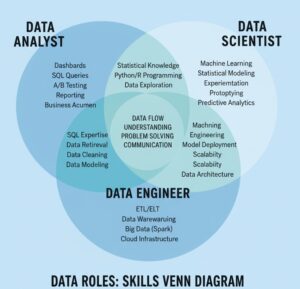
Future Change: AI & Automation Evolution of These Roles
AI is revolutionizing data for data analyst vs data scientist vs data engineer is described below:
- Analysts: basic reporting is to be done by dashboards and automated insights.
- Engineers: focus to drift toward building AI-enabled data workflows in cloud and real-time pipelines.
- Scientists: focus on more explainable AI, human-in-the-loop systems, and generative AI models.
Long-term successes and careers will depend on flexibility and continuous learning in integrating AI into workflows.
Which Role Works Best with One’s Skill Set & Interests
- Analyst: Curious, loves storytelling, enjoys seeing business impacts.
- Scientist: Enjoys coding, modeling, experimenting with predictions.
- Engineer: Loves building systems, solving technical challenges and large-scale infrastructure.
- Optional hybrid paths: Analysts can upskill into Scientists; Engineers can move to ML engineering or AI-related roles.
Data Analyst vs Data Scientist vs Data Engineer Terminologies
| Term | Role (Analyst / Scientist / Engineer) | Simple Meaning | Example in Real Life |
|---|---|---|---|
| Data | All | Raw facts, numbers, or information. | Marks scored by students in a class. |
| Dataset | All | A collection of related data. | A spreadsheet of all students’ marks. |
| Database | Engineer | A place where data is stored in an organized way. | Like a digital cupboard storing school records. |
| Query | Analyst / Engineer | Asking a database for specific information. | Asking: “Show me names of students who scored above 90.” |
| SQL (Structured Query Language) | Analyst / Engineer | A language used to talk to databases. | Like giving commands: “Find top 5 scorers.” |
| Excel / Spreadsheet | Analyst | A tool to analyze and visualize small data. | Making a chart of class results. |
| Data Cleaning | Analyst / Scientist | Fixing errors and removing unwanted data. | Removing duplicate names in the marks list. |
| Data Wrangling | Scientist / Engineer | Transforming messy data into neat, usable form. | Changing “N/A” to “0” in attendance records. |
| ETL (Extract, Transform, Load) | Engineer | Process to move data: take it out, clean it, and store it. | Taking sales data from shop computers, fixing it, and storing it in a big company server. |
| Big Data | Engineer / Scientist | Extremely large data that can’t be handled on normal computers. | Data from millions of YouTube videos. |
| Data Visualization | Analyst | Showing data with charts, graphs, or dashboards. | A pie chart of votes each candidate got. |
| Dashboard | Analyst | A screen that shows data summaries in charts. | Your fitness app showing steps, sleep, and calories at once. |
| Statistics | Analyst / Scientist | Math branch used to study data. | Calculating average marks in the class. |
| Machine Learning (ML) | Scientist | Teaching computers to learn patterns from data. | Netflix suggesting movies you like. |
| Artificial Intelligence (AI) | Scientist | Making machines think and act smart like humans. | Siri answering your questions. |
| Algorithm | Scientist / Engineer | A step-by-step method to solve a problem. | Recipe for making Maggi noodles. |
| Model | Scientist | A computer program trained to predict outcomes. | Predicting tomorrow’s weather. |
| Training Data | Scientist | Data used to teach a model. | Past weather records used to predict future weather. |
| Testing Data | Scientist | Data used to check how well a model works. | Checking predictions on unseen weather data. |
| Pipeline | Engineer / Scientist | Steps arranged to move and process data smoothly. | Like a water pipeline but for data flow. |
| Cloud Computing | Engineer | Storing and using data/programs on the internet instead of your computer. | Google Drive storing files online. |
| API (Application Programming Interface) | Engineer | A way for two programs to talk to each other. | Paytm using your bank app to process payments. |
| Data Governance | Analyst / Engineer | Rules to keep data safe and correct. | School making sure marks are not leaked or changed wrongly. |
| Data Security | Engineer | Protecting data from theft or misuse. | Password-protecting exam results. |
| Data Ethics | Analyst / Scientist | Using data fairly without harming people. | Not selling students’ phone numbers to advertisers. |
PW Skills Advantage: Start Your Journey in Data Careers
PW Skills provides industry-supported introductory hand-on courses in Data Analytics and Data Science. Learn from industry experts while working on real-life projects and equip yourself with the skill-set that can help land you into high-growth roles in India or worldwide. Take your first step towards a data career with structured learning and live mentoring support.
Yes, analysts with programming and statistical knowledge can switch to data science roles by further learning about ML and AI techniques. Most data scientists earn the highest salary, followed by data engineers and analysts. Salary differences depend on the experience, company, and location. Strong coding skills are required for both engineers and scientists; analysts require few coding skills, and knowledge of SQL and Python has become a current expectation. AI is automating repetitive tasks for analysts, requiring engineers to deal with AI-ready pipelines, and pushing scientists towards advanced model building and explainable AI.FAQs
Can I switch from data analyst to data scientist?
Which role pays the most in India in 2025?
Do I need coding for all three roles?
How is AI changing data analyst, data scientist, and data engineering roles?



